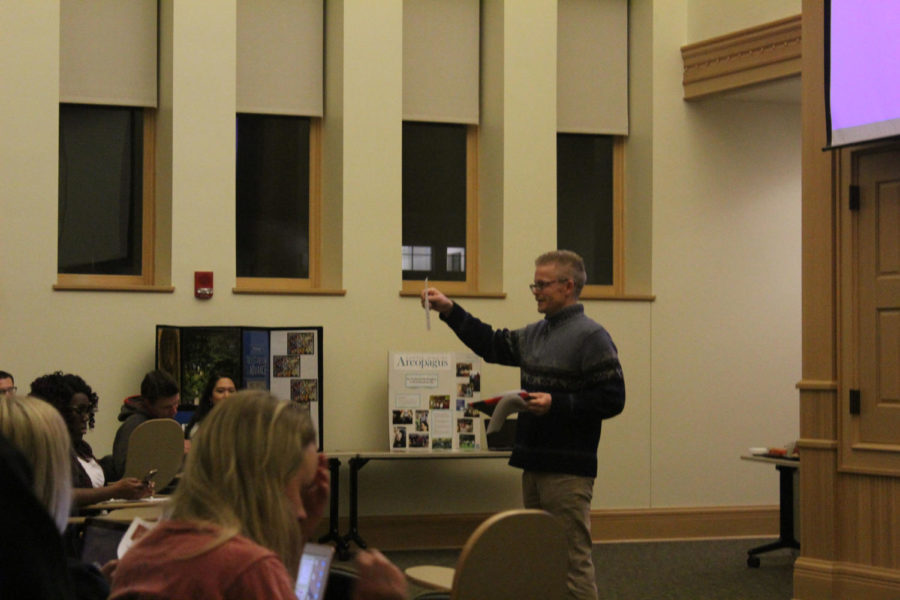Panelists share their vocation during Thursday night discussion
Kennedy DeRaedt/Iowa State Daily
A panel discussion “What is Your Vocation?” was held in Morrill Hall on Jan. 26. Vocation is a strong feeling of purpose or dedication to a career or occupation.People that came were given a sheet for notes and a survey to be filled out at the end.
January 26, 2017
It’s what drives a person. It’s what gets them out of bed each morning. It’s the thing that gives the most rewards in life, with the irreplaceable memories that they experience that makes them who they are today.
This thing is a vocation.
A vocation is a summons or strong inclination to a particular state or course of action. In a panel discussion called “What is your Vocation?,” two individuals shared their vocation to a group of about 30 people in Morrill Hall on Thursday night.
This discussion was a part of the Iowa State lectures program, co-sponsored by Areopagus Student Fellowship and InterVarsity Christian Fellowship.
The first of the two panelists was Jenny Jessup, who is a mobilization specialist for English Language Institute-China (ELIC).
The ELIC is a group that trains Americans to be loving and caring English teachers. These teachers are sent to 13 different countries overseas, including China, Mongolia, Laos, Vietnam, Jordan and Morocco. English is considered an important skill to have in many of these countries.
These teachers build relationships with the people they teach, resulting in life-long friendships and memories that will be shared through generations.
For Jessup, she didn’t know this was her vocation until it happened by pure chance.
“I was having a career crisis, ‘What am I gonna do in life?,’” Jessup said. “My dad sent me an email, and it said, ‘Look into this, it’s one of the top 10 Christian workplaces in America.’”
Jessup said she had a passion for both English and Asia, so she said, “Why not try it?”
During her four weeks in China, she said she saw children learn and grow and built a family with the other Americans who she was with in China. Jessup said she loved it so much that after she graduated college with a degree in biology and a license in teaching, she decided to take a different path and work with ELIC full time.
Jessup’s vocation came when she found the importance of relationships. She found this vocation in building relationships with her students, whom she invited to her house in China to bake.
“In China there are very few ovens. Most of my students have never baked before,” Jessup said. “Seeing dough turn into bread was extraordinary.”
Jessup said the relationships she and her team built in China are the most important part, quoting a pastor who once told her, “Even if [the children] don’t remember the English, they’ll remember the love.”
The other panelist, Mark Osler, has a completely different vocation.
Osler is a professor at St. Thomas Law School and is a former federal prosecutor and legal scholar.
At first, Osler believed his vocation was shutting down crime in Detroit, Michigan, as a prosecutor.
“You are going to connect with the lives of the people, the victims of the crime, the defendant, the people that are members of the family of those groups,” Osler said. “That means you’re going to go home emotionally drained.”
During his time as a prosecutor, Osler persecuted many people who were in the possession of drugs. He truly believed in the minimum sentence, which is 10 years behind bars, thinking it would deter people from possessing hard drugs.
“Over time, I realized it wasn’t doing any good,” Osler said “It’s a market. We were plucking someone out, and someone else would be in their place, and what we’ve done was basically destroy that person’s life.”
Since then, he opened a clinic with a few of the students he taught. They take on federal clemency cases, in which people in prison would ask government officials for mercy for their crimes. As a lawyer, he granted the freedom of many people.
Both panelists started doing something they thought they would love, but through changes and experiences, they found their vocation.
Many students in the audience took home a lot to think about. For Justina Streit, sophomore in marketing and management, the lecture helped her in terms of her own vocation.
“Don’t feel like you have to be someplace if you don’t feel like you’re meant to be there,” Streit said. “Even if it’s not something that you thought you’d be doing, the experiences are ultimately what are going to lead you to what you want to do.”
This takeaway was exactly what Tyler Helfers, director for the Areopagus Student Fellowship wanted for the university as a whole.
“We want to see this institution flourish, to be a great place for people of all different backgrounds and beliefs,” Helfers said. “[The panelists] presented things in a way that challenge all of us to think about what we’re being led to do and how we’re going to go about pursing that.”
















